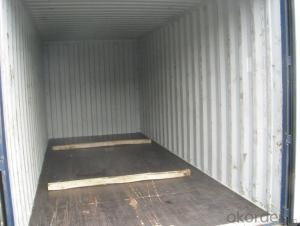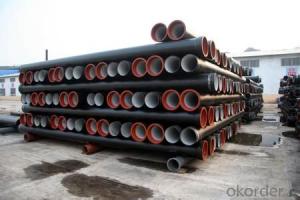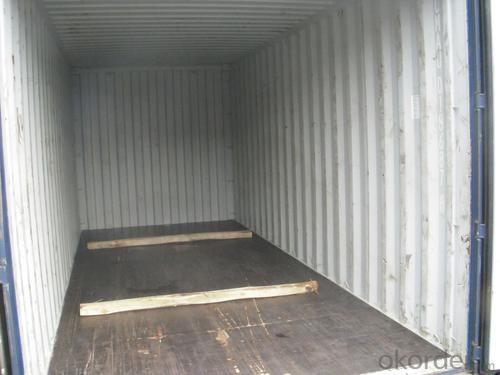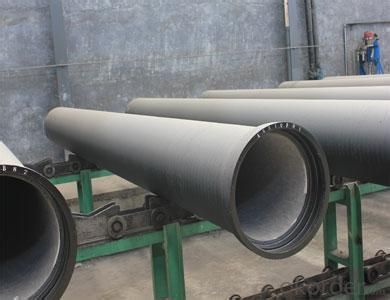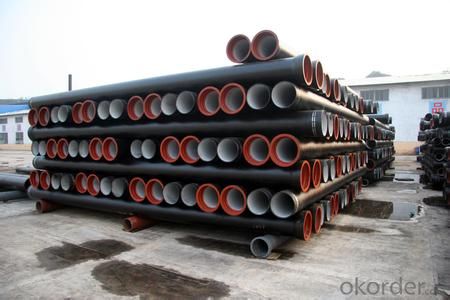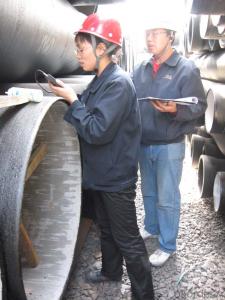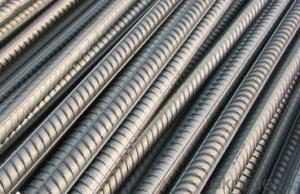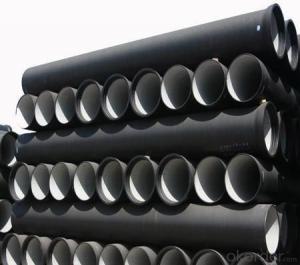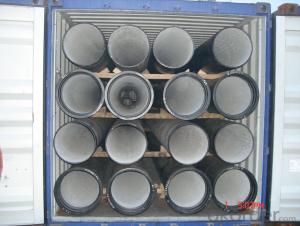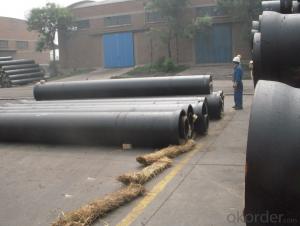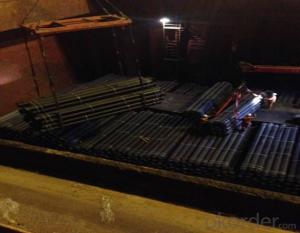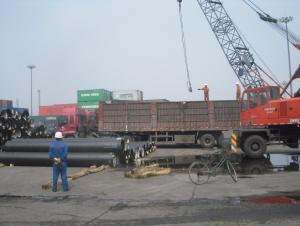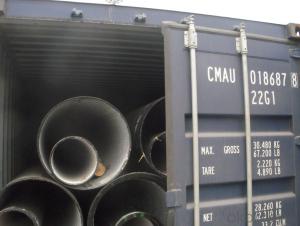DUCTILE IRON PIPES K8 DN1400
- Loading Port:
- China Main Port
- Payment Terms:
- TT OR LC
- Min Order Qty:
- -
- Supply Capability:
- -
OKorder Service Pledge
OKorder Financial Service
You Might Also Like
Ductile Iron Cast Pipe is without any defects compare with tradition casting tech, which has many advantages particularly as follow:
(1) High density. In the "vertical upward casting" process, the melt iron of centre liquid column in center crystallizer is continuously feeding for volume shrinkage caused by condensation tube at outer circumference , which lead to be free of shrinkage porosity.
(2) High purity. When melt iron pouring, the mixed impurities such as gas, dross, sand grain which are lighter than melt iron could be eliminated at furnace mouth, its impossible to enter into the crystallizer through the channel, so the melt iron into the crystallizer is very pure.
(3) Strength with toughness. The cooling speed provided by continuous crystallizer is 30 times than sand casting and 5 times than centrifugal casting, and doesn't produce white iron, the eutectic cell volume of continuous cast iron is one eighth to one tenth compare with traditional cast iron. The density of graphite nodule in ductile iron can reach 300-700 pcs/mm2. Therefore, all reason above improve the strength and toughness of continuous cast iron.
(4) Free machining. The high speed cooling make the hardening phase (such as boride, steadite) not appear like reticular, massive or thick, but diffuse like fish bone and pane in shape, moreover, there are tiny graphite flakes inlaid hardening phase. It's free machining in BrinellHardness the range of 250-300HB. However, the Brinell Hardness of 250 is top limit to common metal materials.
(5) Uniform composition of tube wall. The convection mixing of liquid column caused by marching type drawing in crystallizer make the composition of tube wall well-distributed, and concentration gradient very little.
(6) High productivity. To the wall thickness of tube under 10mm, the speed of continuous casting is 1 meter/min, to the wall thickness of tube under 20mm, the speed of continuous casting is 0.5 meter/min, which is high efficiency that centrifugal or other casting tech couldn't reach.
- Q: Can ductile iron pipes be used in potable water systems?
- Yes, ductile iron pipes can be used in potable water systems. Ductile iron is a type of cast iron that has enhanced strength and ductility. It is a common material choice for water infrastructure, including potable water systems, due to its durability, resistance to corrosion, and long service life. Ductile iron pipes are manufactured to meet specific standards and regulations for potable water usage, ensuring that they are safe for transporting drinking water. Additionally, ductile iron pipes have excellent flow characteristics, making them suitable for water distribution systems. Overall, ductile iron pipes are a reliable and commonly used material in potable water systems.
- Q: How does ductile iron pipe perform in extreme temperatures?
- Ductile iron pipe is known for its exceptional performance in extreme temperatures. Due to its unique composition and manufacturing process, ductile iron pipe can withstand both high and low temperatures without compromising its structural integrity. In high-temperature environments, ductile iron pipe demonstrates excellent heat resistance. It can withstand temperatures up to 1000 degrees Fahrenheit, making it suitable for applications that involve hot liquids or gases, such as steam pipelines or industrial processes. The high strength and thermal stability of ductile iron allow it to maintain its shape and structural integrity even under extreme heat conditions, ensuring long-term reliability and safety. Similarly, ductile iron pipe also performs well in low-temperature environments. It can endure sub-zero temperatures without becoming brittle or prone to cracking, which is a common issue with other materials like cast iron. This makes ductile iron pipe ideal for applications in cold climates, such as water distribution systems in freezing temperatures. Furthermore, ductile iron pipe's ability to resist thermal expansion and contraction is another advantage in extreme temperatures. It has a low coefficient of thermal expansion, meaning it expands and contracts less compared to other materials. This property helps to minimize the stress on the pipe and reduces the risk of leaks or failures caused by temperature fluctuations. In summary, ductile iron pipe exhibits exceptional performance in extreme temperatures. Its heat resistance, ability to withstand low temperatures, and resistance to thermal expansion and contraction make it a reliable choice for various applications, ensuring safe and efficient operations even in challenging environments.
- Q: Is the fire hose capable of using rapid repair joints?
- Installation joint. Insert the socket into the socket to coincide with the central axis of the pipe or pipe to be joined. Use a guide chain to tighten the pipe member until the pipe mouth enters between the two white lines.
- Q: Can ductile iron pipes be used for underground irrigation systems?
- Yes, ductile iron pipes can be used for underground irrigation systems. Ductile iron is a strong and durable material that is resistant to corrosion and can withstand the pressure and load requirements of irrigation systems. It is commonly used in underground applications due to its longevity and reliability.
- Q: Can ductile iron pipes be used for stormwater drainage?
- Indeed, stormwater drainage systems can utilize ductile iron pipes. Renowned for their robustness and endurance, ductile iron pipes are apt for numerous purposes, including stormwater drainage. Notably, these pipes possess remarkable tensile strength, enabling them to endure substantial loads and pressure, rendering them optimal for transporting significant volumes of stormwater. Furthermore, the smooth interior surface of ductile iron pipes diminishes friction and encourages efficient water flow, reducing the likelihood of obstructions and congestion. Through meticulous installation and upkeep, ductile iron pipes can furnish a dependable and enduring resolution for stormwater drainage.
- Q: Can ductile iron pipe be used for industrial applications?
- Yes, ductile iron pipe can be used for industrial applications. Ductile iron pipes are known for their durability, strength, and resistance to corrosion, making them suitable for various industrial settings. They can handle high-pressure and heavy-duty applications, making them ideal for industries such as water and wastewater, oil and gas, and chemical processing.
- Q: What is the weight of ductile iron pipe compared to other pipe materials?
- Ductile iron pipe is generally heavier than other pipe materials such as PVC or HDPE. Its weight can vary depending on the size and wall thickness of the pipe, but in general, ductile iron pipe is known for its durability and strength, which often results in a higher weight compared to other pipe materials.
- Q: How do ductile iron pipes perform in freeze-thaw cycles?
- Ductile iron pipes perform well in freeze-thaw cycles due to their high tensile strength and flexibility. Unlike brittle materials, ductile iron can withstand the expansion and contraction caused by freezing and thawing without cracking or breaking. This makes them a reliable choice for water and sewer systems in regions with harsh winter climates.
- Q: Are ductile iron pipes resistant to environmental stress cracking?
- Indeed, environmental stress cracking is not a concern for ductile iron pipes. Ductile iron, a form of cast iron that has been infused with small amounts of magnesium for enhanced strength and ductility, possesses this advantageous quality. Consequently, these pipes exhibit exceptional resistance to cracking and harm caused by environmental stress factors like temperature fluctuations, soil shifting, and corrosive elements present in the surrounding environment. Moreover, the inherent robustness and adaptability of ductile iron enable it to endure substantial external pressure and stress without succumbing to cracking or failure. Ultimately, ductile iron pipes are a dependable and long-lasting option for various purposes, such as the transportation of water and wastewater, thanks to their ability to withstand environmental stress cracking.
- Q: How are ductile iron pipes connected together?
- Ductile iron pipes are typically connected together using a jointing method called push-on joint. This involves lubricating the spigot end of one pipe and inserting it into the bell end of another pipe. The two pipes are then pushed together until the spigot end reaches the center of the bell end, creating a tight and secure connection.
Send your message to us
DUCTILE IRON PIPES K8 DN1400
- Loading Port:
- China Main Port
- Payment Terms:
- TT OR LC
- Min Order Qty:
- -
- Supply Capability:
- -
OKorder Service Pledge
OKorder Financial Service
Similar products
Hot products
Hot Searches
Related keywords
